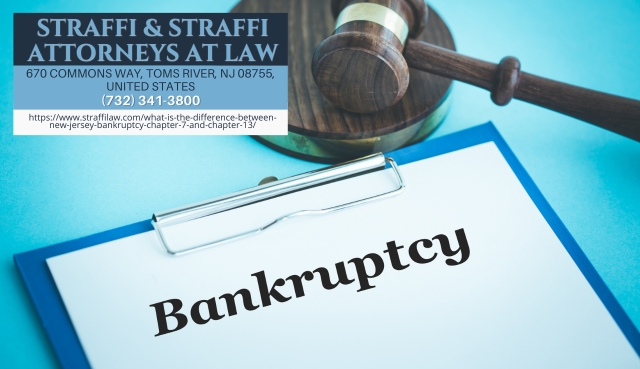New Jersey bankruptcy attorney Daniel Straffi (https://www.straffilaw.com/what-is-the-difference-between-new-jersey-bankruptcy-chapter-7-and-chapter-13/), of Straffi & Straffi Attorneys at Law, sheds light on the critical distinctions between Chapter 7 and Chapter 13 bankruptcy for individuals and small businesses facing financial challenges. When unexpected circumstances such as job loss, illness, or divorce lead to overwhelming debt, understanding these two legal pathways can provide much-needed relief. Daniel Straffi explains how each option offers tailored solutions to help debtors regain control of their financial futures.
Bankruptcy is a federal legal process that provides individuals or entities unable to repay their debts with a structured means of seeking relief. “Filing for bankruptcy,” explains New Jersey bankruptcy attorney Daniel Straffi, “can offer a fresh start by either discharging debts or restructuring repayment plans.” Chapter 7 and Chapter 13, the most common bankruptcy options for individuals and small businesses, serve distinct purposes and suit different financial circumstances.
Chapter 7 bankruptcy, often called "liquidation bankruptcy," involves the sale of nonexempt assets to settle outstanding debts. As the New Jersey bankruptcy attorney outlines, the process includes filing a petition, disclosing creditors, income, and assets, and undergoing a means test to confirm eligibility. Nonexempt assets such as vacation homes or valuable collections are liquidated under court supervision, while essential items such as a primary residence or personal tools may be exempt.
“Chapter 7 can be completed in as little as four to six months,” notes Straffi, “but it’s critical to remember that not all debts are dischargeable, including child support, taxes, and student loans.” This type of bankruptcy stays on credit reports for 10 years, making it a solution best suited for those with limited income and significant unsecured debt.
In contrast, Chapter 13 bankruptcy, also known as the “wage earner’s plan,” allows debtors to retain their assets by reorganizing debt into a manageable three-to-five-year repayment plan. According to Daniel Straffi, this option is especially beneficial for those earning above the state’s median income or individuals seeking to protect assets such as a home or car from foreclosure or repossession.
“Chapter 13 offers flexibility by allowing delinquent payments to be included in the plan,” Straffi explains. Unlike Chapter 7, there is no liquidation of assets, and creditors are paid through structured monthly payments. This type of bankruptcy has a lesser impact on credit, remaining on reports for up to seven years, and may offer a more sustainable path forward for many debtors.
Each type of bankruptcy offers unique benefits and challenges. For individuals with non-dischargeable debts or those aiming to save a home or other significant assets, Chapter 13 may be the preferred choice. Meanwhile, Chapter 7 provides a quicker resolution for those primarily burdened by unsecured debts.
Daniel Straffi emphasizes the importance of thorough consultation before deciding: “Understanding the differences between Chapter 7 and Chapter 13 and how they apply to your financial situation is crucial. Consulting with a bankruptcy attorney can help ensure the best possible outcome.”
Although bankruptcy can significantly impact credit and future financial opportunities, it also provides a way forward for those drowning in debt. Straffi underscores that bankruptcy should be approached as a last resort, with careful consideration of its long-term effects. The firm provides guidance tailored to individual circumstances, helping ensure clients are equipped to rebuild their financial futures.
For New Jersey residents facing financial difficulties, filing for bankruptcy may seem daunting. With Daniel Straffi and the team at Straffi & Straffi Attorneys at Law, clients can gain a trusted ally to manage the complex aspects of the bankruptcy process and make informed decisions toward a brighter financial future.
About Straffi & Straffi Attorneys at Law:
Straffi & Straffi Attorneys at Law, located in Toms River, New Jersey, is committed to helping individuals and small businesses achieve financial relief through sound legal counsel. With years of experience in bankruptcy law, Daniel Straffi and the team can provide personalized support to clients exploring debt relief options such as Chapter 7 and Chapter 13 bankruptcy.
Embeds:
Youtube Video: https://www.youtube.com/watch?v=bSBcMVRNYL8
GMB: https://www.google.com/maps?cid=18340758732161592314
Email and website
Email: familyclient@straffilaw.com
Website: https://www.straffilaw.com/
Media Contact
Company Name: Straffi & Straffi Attorneys at Law
Contact Person: Daniel Straffi
Email: Send Email
Phone: (732) 341-3800
Address:670 Commons Way
City: Toms River
State: New Jersey 08755
Country: United States
Website: https://www.straffilaw.com/







